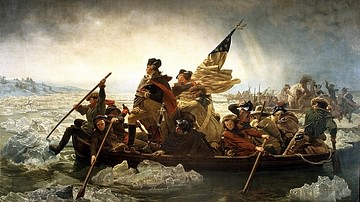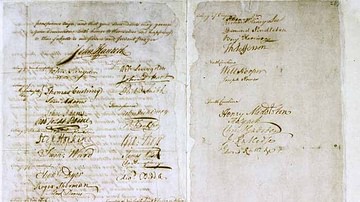Search
Search Results

Definition
Yalta Conference - Roosevelt, Churchill & Stalin Create a New World Order
The Yalta Conference of 4-11 February 1945 was a meeting of the 'Big Three' Allied leaders: President of the United States Franklin D. Roosevelt, British Prime Minister Winston Churchill, and Russian Premier Joseph Stalin. The conference...

Definition
George III of Great Britain
George III of Great Britain (r. 1760-1820) was the third of the Hanoverian monarchs, and he remains the longest-reigning king in British history. His six decades on the throne saw the creation of the United Kingdom, the loss of the 13 American...

Definition
Gertrude Bell
Gertrude Bell (l. 1868-1926) was an archaeologist, travel writer, explorer, and political administrator responsible for creating the borders of the countries of the Near East after World War I and, especially, for the foundation of the modern...

Article
New York and New Jersey Campaign
The New York and New Jersey Campaign (3 July 1776 to 3 January 1777) was a pivotal campaign waged during the American Revolutionary War (1775-1783) for control of New York City, the Hudson River, and the resource-rich state of New Jersey...

Article
Olive Branch Petition
The Olive Branch Petition was a letter adopted by the Second Continental Congress on 5 July 1775 and sent to King George III of Great Britain (r. 1760-1820) in a final attempt at reconciliation in the early months of the American Revolutionary...

Article
The Batavian Revolt
Batavian revolt was a rebellion of the Batavians against the Romans in 69-70 CE. After initial successes by their commander Julius Civilis, the Batavians were ultimately defeated by the Roman general Quintus Petillius Cerialis. The year...

Definition
Anschluss
The Anschluss ('fusion') of 12 March 1938 was the annexation and formal union of Austria with Germany. Adolf Hitler (1889-1945), the Nazi leader of Germany, dreamed of an empire which enclosed all German speakers, his 'Greater Germany'. Hitler's...

Definition
John Hancock
John Hancock (1737-1793) was a merchant, politician, and Founding Father of the United States, who helped lead the Patriot movement during the American Revolution (1765-1789). He served as president of the Second Continental Congress from...

Definition
Mayflower Compact
The Mayflower Compact is the agreement between the 41 male passengers of the ship Mayflower establishing the form of government of the Plymouth Colony (1620-1691), signed on 11 November 1620 off the coast of present-day Massachusetts, USA...

Definition
Patrick Henry
Patrick Henry (1736-1799) was a Virginian lawyer and politician who played a vital role in the American Revolution (c. 1765-1789). Known for his brilliant oration, including the famous Give Me Liberty or Give Me Death speech, Henry served...